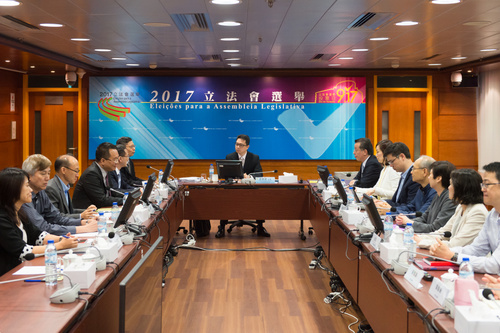 Meeting of the Electoral Affairs Commission for the Legislative Assembly Election.
Meeting of the Electoral Affairs Commission for the Legislative Assembly Election.
The Electoral Affairs Commission for the Legislative Assembly Election plans to make available 24 outdoor public spaces where the campaign teams of the candidates can present their respective manifestos to the public.
That is four more spaces than were available for such use during the 2013 Legislative Assembly Election process, the Chairman of the Electoral Affairs Commission, Mr Tong Hio Fong, disclosed on Wednesday (26 April).
The four new spaces are located: close to the Olympic Sports Centre in Taipa; on the Seac Pai Van public housing estate; at the Northern District Public Services Centre in Areia Preta; and at Macau Baptist College in Areia Preta.
The Commission was looking for further suitable places – ideally with wide public walkways – that would allow candidates’ campaign teams to promote to the public their respective programmes.
Mr Tong additionally said the Commission would install translucent curtains in voting booths, of the same design adopted in 2013’s election. The aim was to ensure privacy for voters during the act of voting, while also enabling polling station staff to monitor their activity well enough to prevent voters taking photographs or making video recordings inside the booths.
Photographing the ballot or recording the process of voting are both against the law. More than 10 instances of such activity occurred in 2013. Some of those detected were sentenced and received a criminal conviction, Mr Tong stated.
Mr Tong added the Commission had noted there were five polling venues where voters would be required either to use a lift or stairs. A principle for choosing a building as a polling venue was whether it had a large space on the ground floor for events.
In other comments, Mr Tong said the Commission had received a letter – forwarded by a third party – containing complaints that teachers were under pressure to nominate a candidate team interested in forming a ticket for the upcoming election.
Neither the Electoral Affairs Commission nor the Commission Against Corruption (CCAC) had received any complaints from people involved. As a result, neither body had been able to verify the origin of the stated complaints. Were there a genuine grievance, the Electoral Affairs Commission urged those involved to come forward and report the matter.
Mr Tong noted it was common at the present stage of the electoral process for individuals to form a nomination committee. All members of the voting public were entitled to do so. However, engaging in coercion of voters for the purpose of achieving nomination was against the law, he added.


